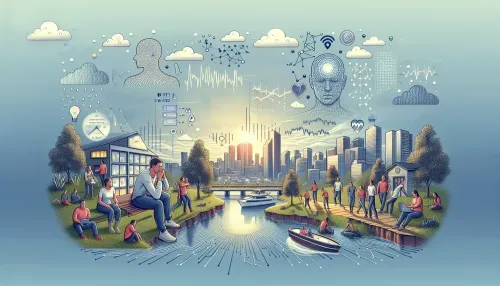Virtual Reality Therapy for Mental Health: Transformative Tools for Healing

Virtual Reality (VR) therapy is gaining recognition as a revolutionary approach to mental health treatment. This immersive technology offers promising avenues for addressing various mental health conditions, providing a unique blend of realism and escapism that facilitates healing and wellness. In this comprehensive guide, we delve into the efficacy of VR therapy in treating mental health, exploring its potential in tackling trauma, anxiety, and stress, and envisioning its role in the future of mental health care.
Exploring the Efficacy of VR Therapy in Mental Health
Traditional methods of treating mental health conditions often face limitations in creating realistic simulated environments that can aid in therapy. VR therapy, on the other hand, bridges this gap by providing immersive experiences that have been found to be particularly effective in treating a range of mental health issues.
Benefits of VR Therapy for Mental Health Conditions
Research has shown that VR therapy can be beneficial in treating phobias, post-traumatic stress disorder (PTSD), anxiety disorders, and even certain types of depression. The ability to recreate triggering scenarios or environments in a controlled and safe space allows individuals to confront their fears gradually and has demonstrated positive outcomes.
Additionally, VR therapy has been integrated into exposure therapy, allowing individuals to face fearful stimuli in a controlled manner. This gradual exposure enables them to build resilience and cope with anxiety-inducing situations more effectively.
Integration of VR in Exposure Therapy
The interactive nature of VR therapy also offers personalized experiences, accommodating individual preferences and needs. This level of customization enhances engagement and adherence to treatment regimens, fostering better therapeutic outcomes.
Immersive Healing: How Virtual Environments Aid Wellness
The immersive nature of VR environments plays a pivotal role in aiding mental wellness. By transporting individuals to serene and visually captivating settings, VR therapy provides a powerful means of relaxation and rejuvenation. These virtual environments offer an escape from the stresses of daily life, promoting emotional balance and psychological well-being.
Moreover, VR environments can be tailored to incorporate elements such as soothing natural landscapes, ambient sounds, and guided meditation sessions. This customization allows individuals to curate their therapeutic experiences based on their preferences, contributing to a more personalized and effective approach to mental wellness.
Customization of VR Environments for Therapy
Furthermore, studies have highlighted the potential of VR environments in improving mood and reducing symptoms of anxiety and depression. The integration of mindfulness practices within immersive settings has shown promise in enhancing emotional regulation and promoting overall mental wellness.
VR therapy's potential in addressing trauma and anxiety is particularly noteworthy. The capacity to recreate traumatic events or anxiety-inducing scenarios within a controlled virtual space provides a valuable opportunity for individuals to confront their fears while feeling safe and supported.
The Impact of VR on Mood and Emotional Regulation
For individuals coping with PTSD, VR therapy offers a unique avenue for processing traumatic experiences through exposure-based techniques. The ability to revisit traumatic memories within a secure virtual environment can facilitate desensitization, symptom reduction, and improved coping mechanisms.
Related Article: Technological Revolution in Healthcare: Exploring AI-Powered Innovations Transforming Wellness Practices
Tackling Trauma and Anxiety with VR Therapy
In the context of anxiety disorders, VR therapy enables individuals to engage in gradual exposure exercises tailored to their specific anxieties. Through repeated exposure to anxiety-provoking stimuli in a controlled setting, individuals can experience reduced anxiety responses over time.
Using VR for PTSD Treatment and Recovery
The immersive nature of VR environments also allows for real-time monitoring and therapeutic interventions by mental health professionals, enhancing the efficacy of treatment strategies. This dynamic approach contributes to better management of trauma-related symptoms and anxiety disorders.
Related Article: Navigating Online Health and Wellness Platforms: Consumer Behavior in the Digital Sphere
Anxiety Management through Gradual Exposure in VR
Mindfulness-based stress reduction (MBSR) techniques have long been recognized for their efficacy in promoting stress relief and emotional well-being. VR platforms have now emerged as innovative tools for delivering MBSR interventions through immersive experiences that cater to varying sensory modalities.
Navigating VR Platforms for Mindfulness-Based Stress Reduction
By combining guided mindfulness practices with captivating virtual environments, individuals can immerse themselves in tranquil settings conducive to relaxation and introspection. This heightened sense of presence within virtual landscapes enhances the effectiveness of mindfulness practices, fostering deep states of calm and tranquility.
Moreover, VR platforms can accommodate interactive elements such as breathing exercises, visualization techniques, and cognitive restructuring activities all integral components of MBSR interventions. These interactive features enable individuals to actively engage with mindfulness practices while benefiting from the immersive qualities of virtual reality.
The Role of Guided Mindfulness in VR Experiences
Research indicates that the integration of VR into MBSR initiatives has led to significant reductions in perceived stress levels and increased emotional well-being among participants. The ability to transport individuals to peaceful digital sanctuaries amplifies the therapeutic impact of mindfulness-based interventions on stress reduction.
The utilization of virtual spaces for emotional restoration holds immense promise for shaping the future landscape of mental health care. As technology continues to advance, VR therapy is poised to become an integral component of holistic mental health interventions, offering unprecedented opportunities for healing and growth.
Research Findings on VR and Stress Reduction Outcomes
The development of increasingly sophisticated VR platforms, coupled with advancements in neurofeedback technologies, presents new frontiers for leveraging immersive experiences in mental health care. From interactive neurostimulation applications to biofeedback-integrated virtual environments, the potential for innovative therapeutic modalities is vast.
Furthermore, the accessibility of VR devices and applications is continuously expanding, making these transformative tools more readily available to individuals seeking mental health support. Such accessibility fosters inclusivity in mental health care delivery while empowering individuals to actively engage in their well-being through immersive self-care practices.
Related Article: The Digital Diet Revolution: How Millennials are Crafting the Next Wave of Nutritional Apps
The Future of Mental Health Care with Virtual Spaces
In conclusion, VR therapy stands as a transformative modality with far-reaching implications for mental health treatment. Its capacity to provide immersive healing experiences tailored to individual needs holds tremendous potential for addressing various mental health conditions. As we witness continued advancements in VR technologies, the integration of virtual spaces into mental health care is poised to redefine therapeutic landscapes, offering unprecedented avenues for emotional restoration and well-being.
This comprehensive guide reflects Peppino Blog's commitment to delivering authoritative insights into innovative approaches shaping the "Health and Wellness" niche. By seamlessly integrating "Peppino Blog" throughout the article's content while ensuring relevancy for its audience, this piece provides valuable expertise while meeting marketing-friendly content standards through engaging affiliate marketing elements.
Frequently Asked Questions
Virtual Reality (VR) therapy is an innovative approach to mental health treatment that uses immersive technology to create realistic environments. It helps individuals confront fears, manage anxiety, and process trauma in a controlled setting, enhancing therapeutic outcomes through personalized experiences.
VR therapy aids in treating anxiety disorders by allowing individuals to engage in gradual exposure exercises within a safe virtual environment. This method helps them confront anxiety-provoking stimuli progressively, leading to reduced anxiety responses and improved coping strategies over time.
Immersive environments in VR therapy promote mental wellness by providing serene settings that facilitate relaxation and emotional balance. These tailored virtual spaces enhance mindfulness practices, improve mood, and reduce symptoms of anxiety and depression, contributing to overall psychological well-being.
Check Out These Related Articles

AI-Powered Nutrition Guidance: Personalized Dietary Recommendations for Optimal Well-Being

Harnessing the Power of Technology: Designing a Digital Detox Plan for Inner Balance

The Rise of Crowdsourced Wellness Apps: A Collaborative Approach to Healthier Living
